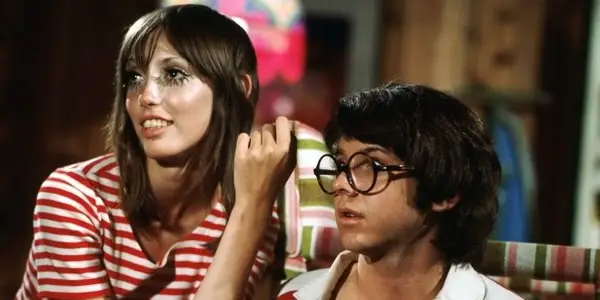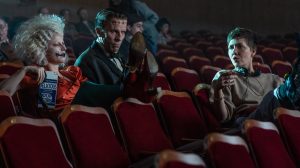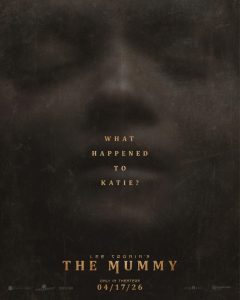
Throughout her life in the public eye, Shelley Duvall, who died yesterday, would tell the same story over and over again. After hosting a party for her artist husband, Robert Altman (who had been in attendance) offered her a role in her first movie, Brewster McCloud (1970). “I’m not an actress,” she replied. “Yes, you are,” he insisted. By the time she won the Best Actress Award at Cannes seven years later for her performance in his 3 Women, she had visited and dismissed Lee Strasburg (“it just wasn’t for me”), and settled into a style she called “instinctive.” She once recalled marveling, “boy, if it’s this easy, why doesn’t everybody act?”
Brewster McCloud (1970) -source: MGM
In most of her films, Duvall’s characters were defined by the strange, guileless naturalism she brought to her roles, exemplified best by her ability to talk: Leaning her chin on one thin-boned hand, smoking a long, skinny cigarette, or bustling around a room like a tornado in miniature, she could open her mouth and let her motor run, at once quotidian and insightful, goofy and sweet and layered with hidden meaning. And no wonder: Her father was a member of that talkiest of professions, a Texas cattle auctioneer; Shelley’s mother eventually nicknamed young Shelley “Manic Mouse” for her similarly fantastic energy and the delicate soprano drawl that made her so well-suited to play roles like Olive Oyl in Altman’s Popeye. Her deliveries were characterized by what Roger Ebert called “matter-of-fact banality,” giving voice and shape to her character’s inner lives through musings on the little things, a love for tuna melts (or hatred of tomatoes) in 3 Women, a fascination with Bob Dylan in Annie Hall, an affinity for wigs (and dislike for her aunt) in Nashville. The frankness of her deliveries could cut any turn of phrase down to size, awakening the absurd within the average in the process: “Having sex with you is really a Kafkaesque experience,” she plainly informs Alvy Singer, eyes wide.
Nashville (1975) -source: Paramount Pictures
Matter-of-Fact Banality
This chatty style was all hers in life as well. She researched her roles by talking to strangers with similar experiences to her characters (for example, befriending groupies preparing for Nashville) and running commentary was so natural to her style that Ebert’s 1977 interview with her is made up, mostly, of block text, a stream of observation that comes to feel more like a stream of consciousness:
Look here. Persimmons. That’s an old, old olive tree… Lemons… Here’s my lemon tree. These here are Japanese seedless pomegranates. And look at my poor birdbath. I bought it yesterday and filled it up with seed, and then it went and rained for the first time in months and the seed is all two inches underwater…. This will be my Christmas tree… see how the deer come up and nibble from it? I leave the outdoor faucet dripping so they can get a drink. Good lord! What’s this?
All at once, though, the actress could fall silent, huge doe eyes filling any frame of film with raw emotion and vulnerability, from abject fear to pure joy to brittle rage to alarming, opaque blankness. In The Shining, her voice falters describing Jack’s abuse even as she explains it away with a fragile, carefully constructed wall of words, fluttery hands shaking as she lights a cigarette, ash collecting precariously on its end as she goes still (“It’s just the sort of thing you do a hundred times with a child, but–– on this particular occasion…”). In McCabe & Mrs. Miller, she barely speaks at all, letting her drawn face and haunted expression speak for her. Describing her personal experiences with Altman on set, she explained, “When I’m mad at him, I don’t say anything. Silence is the worst punishment.” She had the gift of gab and knew how–– and when–– to use it.
The Shining (1980)- source: Warner Bros.
Matter-of-Fact Vulnerability
The anti-method embodiment of her roles on screen is most visible in her astonishing turn as Millie in 3 Women. Her sixth act of co-creation with Altman, Duvall wrote about half of her own dialogue. Through Duvall’s influence, Millie, a lonely nurse trying to build herself a fuller life through sheer willpower, becomes an actress. She arrives to work each day in a torrent of words, musing on hula dancing (“I think it’s sexy”) and the best way to cook a hotdog (“burned to a crisp”) as she follows behind her coworkers, who all dutifully ignore her. At lunch, she sits between men who don’t meet her eye, insisting on their attention with a flood of recipe ideas. At her apartment complex, she gamely soldiers through cruel muttered jokes at her expense with a sunny smile. She fills her diary with fantasies of friends and dates and parties she never quite brings to pass. “I plan everything I do,” she tells her new roommate Pinkie (Sissy Spacek), “I figure out what I want, and I set out to do it.” But only ever with words–– she loves Scrabble, she confesses repeatedly. “I put so much of myself into Millie, especially the parts I don’t care to see, all the vanities and the mundane things,” she later said. “No one likes her because she’s boring, and because all she can talk about is recipes. She lives in a fantasy… and totally ignor[es] the truth—that she really isn’t popular.”
As the film, based on a dream Altman had, slowly morphs into a psychological thriller a la Persona, Millie speaks less and less, but when she does, it’s most significant in its understatement. “Push or do something,” she bemusedly tells her landlady, who has been left alone to give birth without help or guidance. Her instructions and declarations, flatly given here and in all of her films, are her only means of insisting on her own existence, on asserting control in the man’s world around her. “Wake up, it was only a bad dream!” she wails to Danny in The Shining; “He needs me, he needs me, he needs me!” she sings in Popeye.
3 Women (1977) -source: 20th Century Studios
But this very feminine act of vulnerable self-performance, her gameness to fill space regardless of the discomfort that comes with it–– the hallmark, as Altman likely noticed on their first meeting, of a very good hostess–– often made her the butt of the joke. In Annie Hall, she describes a Bob Dylan concert to Allen’s character as “transplendent, that’s the only word for it, transplendent.” Allen looks at her, looks around, deadpans: “I can think of another word.” Even in obituaries, Duvall’s heart-rending performance as Wendy in The Shining has been treated as an understandable if unfortunate product of stress from a difficult shoot, with all the credit for its rawness attributed to Kubrick and all the blame for its “maximalism” placed on Duvall. Though Janet Maslin complimented her Wendy in clinical terms “as an almost freakish cipher, her early banality making her terror all the more extreme,” Stephen King called the role “one of the most misogynistic characters ever put on film. She’s basically just there to scream and be stupid.” She was given a Razzie. Her gift for the quotidian was conflated with her acting, and then with her.
Conclusion
Duvall’s career began to decline after the brutal reception of her performance in The Shining. “How would you feel if people were really nice, and then, suddenly, on a dime… they turn on you? You would never believe it unless it happens to you. That’s why you get hurt, because you can’t really believe it’s true,” she explained later in life, after years of mostly polite deflections. In each of her most powerful roles, this fragile, hopeful, feminine insistence on human kindness, on fantasy, on selfhood, is on display–– an interiority shielded and revealed by words themselves, by the very act of speaking or staying silent. In a 1977 interview she reflected that, “They say there are not many good women’s roles, but I think the Sylvia Plath role in ‘The Bell Jar’ is a great one. I’d also like to play a woman who is not victimized, a witty, articulate, charming character.” This desire to play characters full of sharp wit and deep longing, someone with a quick mind and a quicker tongue, made perfect sense for Shelley Duvall–– she, herself, was one.
Does content like this matter to you?
Become a Member and support film journalism. Unlock access to all of Film Inquiry`s great articles. Join a community of like-minded readers who are passionate about cinema – get access to our private members Network, give back to independent filmmakers, and more.












